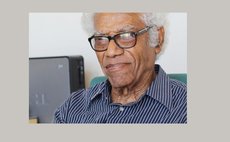South African police accused of incompetence, theft at Oscar Pistorius murder trial

JOHANNESBURG, March 14 (Xinhua/Sun) -- Allegations of incompetence and possible theft by South African police emerged on the 10th day of the murder trial of South African Paralympic athlete Oscar Pistorius in the North Gauteng High Court in Pretoria on Friday.
Pistorius has pleaded not guilty to murdering his girlfriend, Reeva Steenkamp. He admits he shot her dead on Feb.14, Valentine's Day, in 2013, thinking she was an intruder.
Former South African police colonel Schoombie van Rensburg, under cross-examination by Pistorius's lead advocate Barry Roux, admitted on Friday that two of the athlete's eight watches had disappeared from the crime scene during police investigations. He said he had opened an official case of theft and that all police and other personnel at the scene had been searched, to no avail.
One of the watches was taken by Pistorius's sister Aimee, who came to collect his clothes, but there was no trace of the other, reported to be valued at 10,000 U.S. dollars.
Asked by Roux to describe how he felt when hearing of the theft, Van Rensburg told the court: "I said, 'I can't believe it. We were just there. How can this watch be gone?'"
"I was furious," he said.
Under pressure from Roux, Van Rensburg also told how he saw another police official picking up the 9mm pistol used in the crime
"At that particular moment the ballistics expert was handling the firearm without gloves," Van Rensburg said.
Such handling is against South African police regulations and could damage the case against Pistorius. The athlete's lawyer Roux also highlighted discrepancies between two sworn statements made to the police by Van Rensburg and his testimony in court on Friday.
Roux pointed out differences in Van Rensburg's versions of who was present at the crime scene at various times.
Allegations of police incompetence also surfaced on March 12 and 13 when the door from the crime scene was used as a court exhibit. Roux was able to show, through prosecution witness, police colonel Gerhard Vermeulen, that the door brought to court bore marks different from those shown in police photographs taken shortly after the crime.
For example, a footprint had been made on the door, resembling that of police-issue footwear. Vermeulen was forced to concede that the door used as an exhibit was not in the same condition as when it was removed from the crime scene and placed in police custody.
In addition, Vermeulen did not carry out tests to determine whether Pistorius could indeed have tried to kick the door with his prosthesis, as stated in his bail application.
The Citizen newspaper in Johannesburg commented on Friday that, "there is growing support for the view the South African police did not do their work properly".
Under South African law, an accused can be acquitted of murder if his lawyers can show that the case has not been proved beyond reasonable doubt. That is what Roux is trying to do by pointing out inconsistencies in the state's case against Pistorius.
Roux has become a celebrity, with several parodies of his style of questioning being aired on social media in South Africa. A comical song using his catch-phrase, "I put it to you" is proving popular on South African radio stations.
The maximum sentence Pistorius can receive for murder is life imprisonment, which is 25 years. Many South African prisoners are released early on parole.
The trial resumes on Mar. 17
Pistorius, 27, admits he shot and killed Steenkamp in his luxury home at Silver Woods Pretoria in the early hours of Feb.14, 2013. She was locked in the bathroom of his home at the time of the shooting, with at least one cell phone in her possession.
Pistorius has often been depicted in South African media as an avid fan of guns. He routinely slept with a firearm and a cricket bat nearby, in order to defend himself.
He is also charged with several offences under South Africa's Firearms Act. These include discharging a firearm from a moving vehicle in 2012, discharging a firearm in a plush Johannesburg restaurant on January 2013, and unlawfully having ammunition in his possession at his home.
Both the prosecution and the defence acknowledge that Pistorius fired four shots through a locked toilet door, hitting Steenkamp.
During a bail application in 2013, South African state prosecutor Gerrie Nel claimed that Pistorius had put on his prosthetic legs, walked across his bedroom to the bathroom, and intentionally shot Steenkamp through the door. This interpretation has been challenged by the defence.
Pistorius maintains that he had not put on his prosthetics before shooting into the bathroom. He said he had thought Steenkamp was in the bed, and that the person in the bathroom was an intruder.
Pistorius was born with deformed feet and without fibula bones in his legs. After both legs were amputated below the knee when he was 11 months old, he overcame many obstacles to win a clutch of medals at the Paralympics.
In the 2012 London Olympics Pistorius became the first double-leg amputee to participate in Olympics alongside able-bodied athletes when he competed in the men's 400 metres and 4X400 metres relay races.
He has been a poster hero for several companies. At the time of the shooting he was earning an average of two million U.S. dollars a year.




